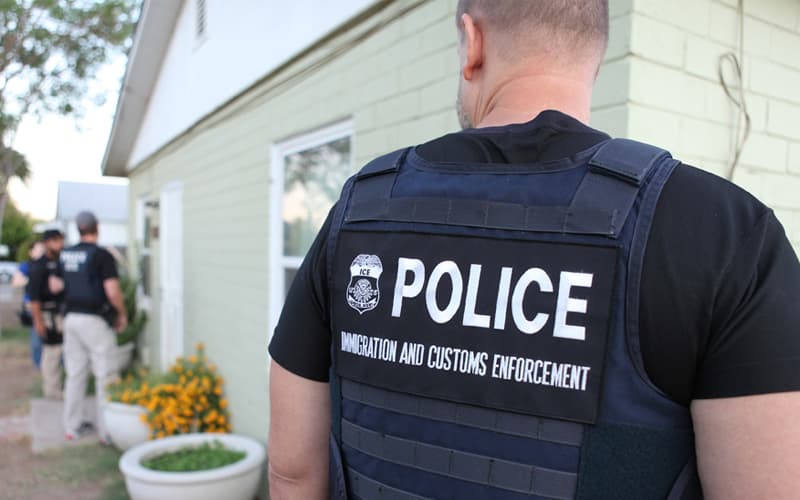In a formal letter to Immigration and Custom Enforcement, Denver Mayor Michael Hancock and numerous city leaders asked the agency to respect the long-standing practice of staying away from certain "sensitive areas," including schools and courthouses.
The letter also asks ICE officers to stop identifying themselves as "police." saying that it creates confusion and alarm in immigrant communities.
Hancock was joined in his request by the entire Denver City Council, District Attorney Beth McCann, City Attorney Kristin Bronson, Denver County Court President Judge Theresa Spahn and Denver Public Schools Superintendent Tom Boasberg.
Denverite was the first English-language media outlet to report on video that confirmed ICE agents waited in a courthouse hallway to arrest someone on immigration violations while they were in court on a different matter. The City Attorney's Office has since reported that some crime victims won't assist with prosecutions because they fear getting picked up by ICE.
This week, the Department of Homeland Security said it won't promise not to arrest crime victims and witnesses on immigration violations, a statement that caused widespread concern among local law enforcement. Police in Los Angeles have described a significant decrease in reports of crime in recent months, which officials there attribute to fear among immigrant communities.
The "sensitive locations" policy is described in an ICE memorandum from 2011 and has not been formally rescinded, at least not yet.
The Denver letter highlighted a March 14 ICE enforcement action that took place right next to a charter school that serves a mostly immigrant population and occurred during the morning drop-off period. Denver officials said this action violated the spirit and possibly the letter of ICE's own policy.
The action occurred at a house "in plain view of parents and children coming to and from" Colorado High School Charter.
"The hour and location of this action potentially put children, staff and parents in danger should your agents have encountered resistance, and clearly caused alarm to the principal and the community served by the school," the letter states.
"We are not aware of any exigency that would have required the enforcement action to occur at that location and at that hour. We strongly urge ICE to refrain from future enforcement actions near schools in Denver that do not comport with the sensitive locations policy."
Video from this incident shows ICE agents in black uniforms with the word "police" in large white block letters and the word "ICE" in much smaller letters.
"The Denver Police Department has worked tirelessly to reassure the immigrant community that they should feel comfortable calling the police and reporting crimes," the letter states.
"Our local police rely on information and cooperation from our immigrant community to protect the entire city. Identifying yourselves as 'police' confuses and erodes the trust between our local police and the immigrant community, endangering the community at large."
ICE spokesman Carl Rusnok said the agency would respond directly to the mayor via "appropriate channels." He added that ICE does not consider courthouses to be "sensitive locations" but nonetheless only makes arrests there after "exhausting other options."
ICE contends that by not holding prisoners for immigration authorities, local jurisdictions force agents to sometimes go to courthouses. Because people are screened for weapons before entering a courthouse, it's safer to arrest people there. Arresting people in the community puts agents at greater risk, he said. It can also be time-consuming to find people who use aliases and provide false addresses to authorities.
(For the record, the man whom agents reportedly were waiting for in the video referred to above had a felony record but had never been charged with a violent crime.)
"Sensitive" locations include schools, hospitals and places of worship.
"U.S. Immigration and Customs Enforcement (ICE) deportation officers carry out targeted enforcement actions every day in locations around the country as part of the agency’s mission to protect public safety, border security, and the integrity of the nation’s immigration system," he said in an email. "ICE also periodically conducts expanded enforcement actions as operational needs demand. The agency’s pursuit of criminal aliens is motivated solely by our commitment to promote public safety."













